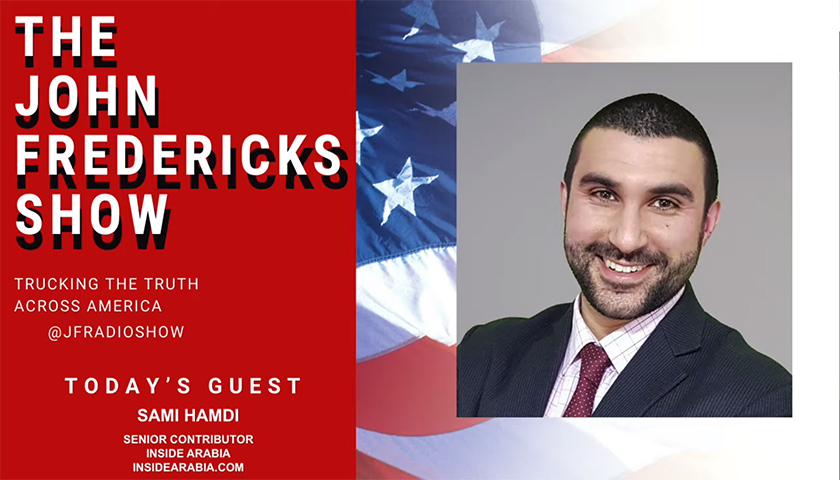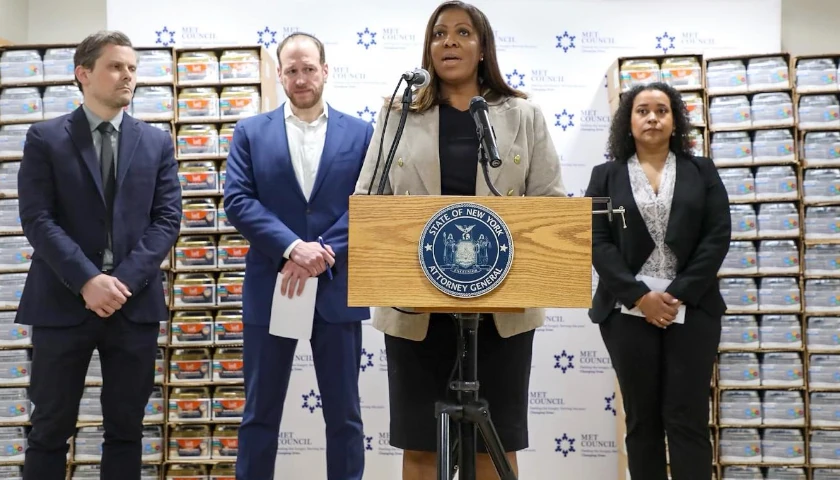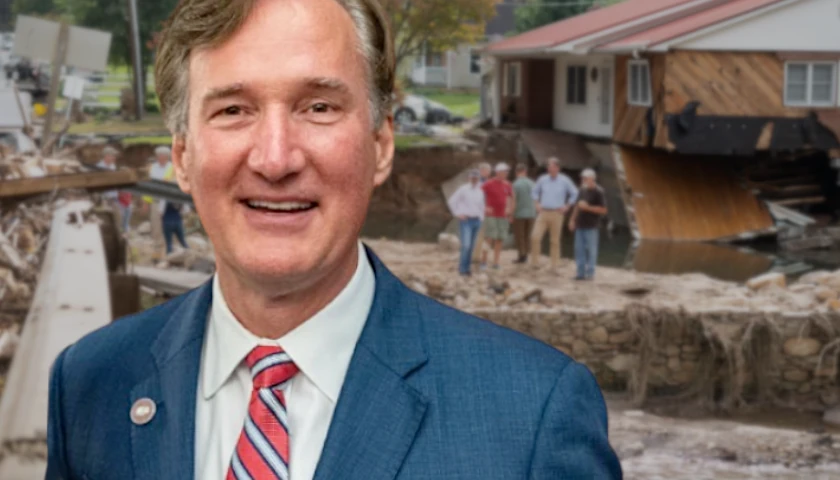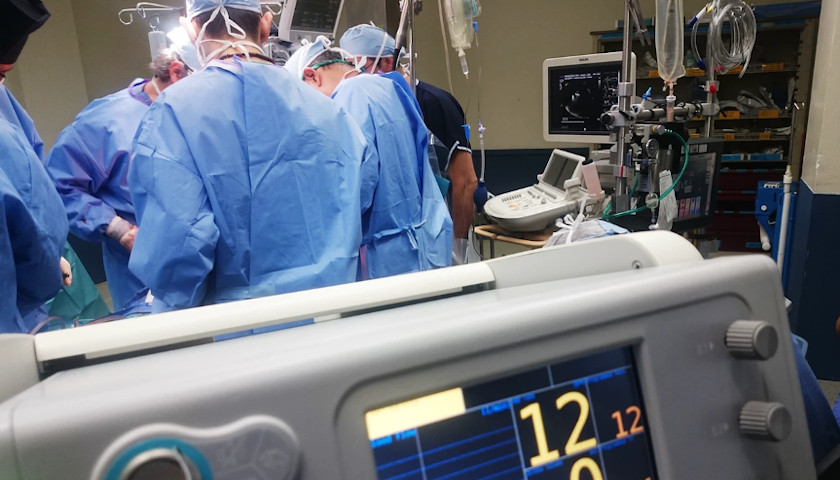Live from Virginia Friday morning on The John Fredericks Show – weekdays on WNTW AM 820/ FM 92.7 – Richmond, WJFN FM 100.5 – Central Virginia, WMPH AM 1010 / FM 100.1 / FM 96.9 (7-9 PM) Hampton Roads, WBRG AM 1050 / FM 105.1 – Lynchburg/Roanoke and Weekdays 6-10 am and 24/7 Stream – host Fredericks welcomed Senior Correspondent for InsideArabia.com Sami Hamdi to the show.
During the show, Hamdi analyzed the current political power struggle between Khalifa Haftar and Aguila Saleh in Libya amongst the protests of the east and west.
Fredericks: Joining us now from London, UK, Senior Correspondent with InsideArabia.com, Sami Hamdi. It’s always good to have him on. Haven’t had him on in a few weeks. Sami, thanks for being with us today.
Hamdi: Thanks for having me, John.
Fredericks: It’s always good to have you on, man. I want to talk about a recent piece that you just did on Libya’s cease-fire and this protest and foreign interference. This Libya situation, a lot of people in the US have now tuned out because of the election.
This is why I have you guys on, because there are other things going on in the world besides Biden and Trump. The Libyan situation is out of control. Obviously you had the bombing going on there. The explosion. You’ve got Haftar situation. You’ve got Turkey involved. Give us an update. Where are we now on Libya? What is going on there?
Hamdi: So for the first time in Libya’s conflict you now have a balance of power in terms of the military dynamic. Because Turkey is now supporting the internationally-recognized government, which before was a very force on the ground. There has now been a balance of power with Russia and Egypt and the UAE and France on one side. And Turkey and on the other side . And the US just watching to see who the eventual winner is going to be.
So because the stakes are very now because of this balance of power. The international power brokers of Turkey, Russia, Germany and Egypt sat together and said look, the price is about too high to keep fighting. Why don’t we come to some sort of agreement in regard to a cease-fire?
And the interesting thing is that despite the fact that you have these two blocs that are competing with each other – these two international blocs – their interests have started to align. Let’s start with Turkey. Turkey and the west now have some control of military bases. It’s now building a naval base in Misratah, which is on the coastline of the Mediterranean, which will allow it to project it’s power on the Mediterranean.
Russia has been able to bypass the US which has not had a clear policy at all, and has not indicated at all what it wants in Libya. Russia has been able to bypass the US and exert itself and secure its key military bases in the south and seize control of some of the key oil facilities. In terms of Egypt, they just want the war to finish, because they’ve got a headache with regards to Sudan and Ethiopia over the Renaissance Dam.
They also have a problem in the East Mediterranean. There is a lot of tension there, so there is a war that might happen there. So Egypt wants Libya to end so it can focus on more important issues. So all of these interests align together to bring about this cease-fire.
You’ll notice I haven’t mentioned the Libyans. Because Libyans are not in the driving seat. The matter has always been one of the international powers, because both sides of the international government and in the Haftar in the east, their power comes from international support.
It does not come from domestic popularity. Both sides are resented by their respected Libyan citizens that live in the territory. And that’s why it’s ironic that despite this cease-fire, we now see protests emerging in the east and the west. It’s not just in Tripoli, but also in Haftar’s territory where the people are saying, listen, you elites have fought this war for a long time now. For eight years.
All because you guys are fighting for your seats and the power. We are the ones suffering from the blackouts and the various different tragedies, whether its the civilian casualties or lack of access to food and basic essentials. In a nutshell, that’s where Libya is moving. The problem now is that there’s now clear passage or no clear view as to where do we go from here. Who will look over the negotiations? What kind of terms are we discussing? Can we do elections the way that Egypt suggested?
Some elections in the east and some elections in the west, and then they appoint a president between themselves. The US is minding its own domestic situation, which you know better than I do. Trump, Biden nobody is clear over who is going to win in the upcoming elections.
The US is concerned with its own internal issues. And he’s essentially saying in regard to Libya, at the end of the day, the winner is going to come to Washington anyway. When you guys figure it out, let us know and then we’ll get to a vote. So that’s it in a nutshell.
Fredericks: So because of the political situation we are sitting this one out. The Trump administration is not getting directly involved or weighing in one side or the other is what you are saying. I’ve been telling you for a long time, folks, as goes the Middle East so goes everything else.
You want to go to InsideArabia.com based in Washington, D.C. Sami, a couple of questions here. Let’s get to ex-general Haftar and his Libyan national army. Where is he in this now? He was gaining control. There was a time there where he looked like he might be in a position to take over. Where is he now?
Hamdi: So Haftar had his chance to establish control over all of Libya when he was attacking Tripoli the capital. He had an implied green light from Washington and from Paris who basically said listen, we are not going to get involved in this if you can bring about a quick resolution to this offensive and unite Libya. Then we are happy to recognize you.
But just find a way to end this war. But Haftar failed in the offensive. Haftar was unable to take over Tripoli and the Turks came in and dragged him all the way back to Sirte, which is bang in the middle of Libya. Because of his spectacular failure, all of the international partners that were supporting him went back to the table and said listen, we need to find an alternative. We can no longer continue to support Haftar. He doesn’t listen to us too much, so let’s find an alternative.
So the attitude supports a rival of Haftar called Aguila Saleh, who is the political face and the Speaker of the parliament in the east. And instead of Haftar going to Moscow or going to Paris or different capitals as the diplomatic faith, Aguila Saleh became the diplomatic face, which was a clear sidelining of Haftar. And Egypt also made clear to Haftar that there is going to be a few changes and Haftar will have to accept it. Haftar of course is not happy because Hester’s relevance is contingent on the continuation of the war.
Haftar is only as relevant as long as the war continues to go on, because he offers that military solution. But there is a political process that requires liaising cooperation between the various parties and gives space for his rivals in the east to start imaging visiting Cairo themselves and Moscow and the like. The problem perhaps now is if he brings the cease-fire then he angers Egypt and Russia. And if he doesn’t bring the cease-fire, then Egypt and Russia are already sidelining him and empowering his rivals. So he’s in a very very awkward situation.
Fredericks: So what does he do?
Hamdi: So essentially the US sent a delegation there to see Haftar, not necessarily to tell him don’t worry about it, but to say to him, look this is how we see it going forward. It’s going to be a negotiated transition. We’re going to try and negotiate from various different parties, and you failed in the offensive so we need to see where we go from here.
Haftar the reality is that he is not entirely sure what he’s supposed to do. For Haftar, what is working in his favor and the reason he is quiet and the reason he hasn’t broken the cease-fire, is because of the protests in Tripoli. It’s like a gift from heaven for Haftar. There are problems in Tripoli. They are complaining about energy cuts. The reason there are energy outages is that Haftar is preventing oil from being exported. So the proceeds of oil are not going to Tripoli.
So they don’t have the money to maintain their energy requirements of Tripoli. So Haftar is suddenly realizing that wait, I don’t actually need to go back to war. If I am just patient and wait for these protests to bring down the government and exacerbate these protests by continuing my oil blockade, then it may well be that when the government falls and the militias in the west start fighting each other once more and stop being united, then I can launch another military offensive and sweep up afterward. So this I think is the gamble that Haftar is waiting for.
Fredericks: Sami Hamdi with us. Excellence analysis. Go to InsideArabia.com on the Libyan situation. Sami, thank you for that.
Listen to the full show here:
https://youtu.be/sqLFGKb9cB0
– – –




